Introduction
In America, cartoons have been a very popular way to discuss various social issues. There are websites and magazines dedicated solely to this genre. To achieve expressiveness, cartoonists usually employ devices such as hyperbole, irony and satire (Sterling 254).
Main body
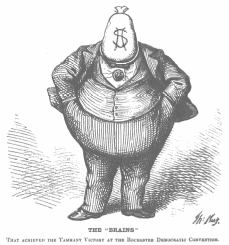
In this cartoon, a stout man in a formal suit is depicted. His posture is confident and steady, and his hands are in his pockets. This character is William Marcy “Boss” Tweed, a corrupt American politician of the 19th century. The cartoonist, Thomas Nast, mocks him for bribetaking. He did a whole series of cartoons on this issue, and their impact on the American society was enormous (Boime 43).
This cartoon is laconic, and this makes it universal. At the same time, it is very indicative of its hero’s nature – one even can guess his nickname.
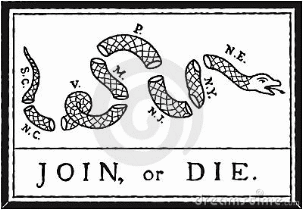
In this cartoon, there is a snake cut into parts. By each part, there are initials. The most arresting part is the slogan – it sounds rather intimidating. Maybe those who do not join will be cut into parts just like this snake?
This 1754 cartoon by Benjamin Franklin urges the American colonies to stay united. The parts of the snake represent the American colonies, some of which were not included. The image was widely used as a symbol of unanimity and resistance in several political conflicts (“Join, or Die”).
Like any good cartoon, this one is simple but eloquent, and it strikes the viewer’s emotions momentarily.
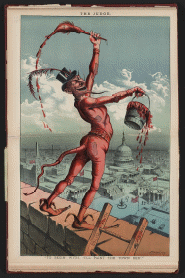
The devil with a bucket of some red substance is standing on top of a brick wall smiling. In the background, there is a city in which Washington, D.C. is easily recognized (“To begin with, I’ll paint the town red”).
The devil with a bucket of what looks like blood is a very vivid metaphor for bloodshed. On closer inspection, we notice that the devil’s waistband says “democracy”. Such a depiction certainly says enough about the author Grant E. Hamilton’s opinion on the subject – he sees democracy as problematic, to say the least.
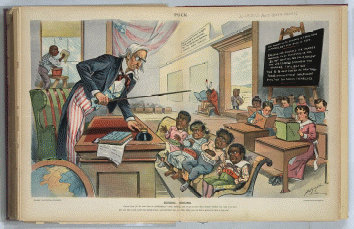
In this cartoon, we see Uncle Sam teaching little children whose waistbands say “Philippines”, “Hawaii”, “Puerto Rico” and “Cuba”. We notice that the children look shocked and even scared, and Uncle Sam looks angry and intimidating. We instantly feel sorry for the children.
This 1899 cartoon by Louis Dalrymple explores the American colony policy. The message here is that the colonizers should ask for the consent of those colonized, and the author clearly disapproves of the current situation (“School Begins”).
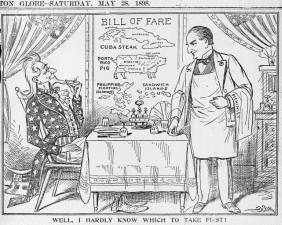
This is another cartoon condemning the USA’s foreign policy. Uncle Sam is at a restaurant, and a waiter named McKinley (the then USA president) is serving him (“Well, I Hardly Know Which to Take First”). The menu includes different territories as if they were meals, which makes the whole situation uncomfortable to observe.
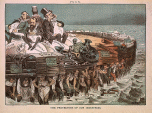
Here we see famous American businessmen sitting on a raft carried by many poorly dressed workers. We notice their sad, tired faces at once. This image implies that these magnates have built their fortunes upon the grassroots’ hard and low-payed work. The author, Bernhard Gillam, clearly disapproves of this situation, so does the viewer (“The Protectors of Our Industries”).
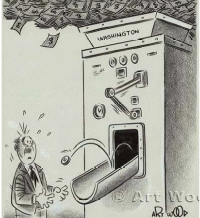
This cartoon shows a lot of money falling into a huge machine. The man, however, catches but a little coin, and we see he is surprised. This cartoon implies that average citizens get very little from the taxes (“Washington Money Machine”). This issue can be applied to many countries, and many people can be sympathetic with the character.
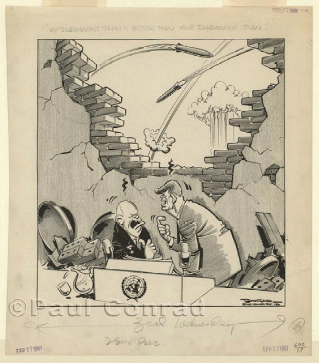
This cartoon features John F. Kennedy and Nikita Khrushchev having a discussion about whose Disarmament plan should be performed. Behind them, there is a hole in the wall, and we can see missiles and explosions (“My Disarmament Plan Is Better Than Your Disarmament Plan!”). The background and the characters’ words form an oxymoron, it is clear that the leaders do not mean what they are saying. This drawing is heavy with satire and promotes pacifism.
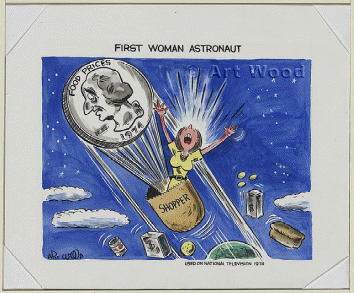
The title of this 1974 cartoon by Art Wood is, of course, ironical. The woman in the picture is not an astronaut but a housewife. A balloon saying “food prices” is taking her into space, and this is not a pleasant journey. The lady is desperate because the food prices are growing rapidly (“First Woman Astronaut”). We immediately feel sorry for this woman who now will have to learn to survive in the brave new world of costly food.
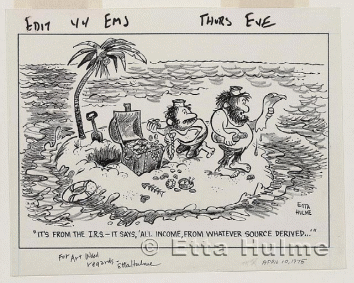
In this 1975 cartoon by Etta Hulme, a man has found a treasure on a desert island. The other man is reading a document from the Internal Revenue Service, which says they have to declare their find. Both seem surprised and shocked, the whole situation is absurd (“It’s from the I.R.S. – it says, ‘all income, from whatever source derived…’”). Bottles with letters do not travel this fast, so the I.R.S. must really want to know about all the citizens’ money. The bitter irony can be felt here, as paying taxes is usually an unpleasant routine.
References
Boime, Albert. Thomas Nast and French Art. American Art Journal, 1972. Print.
“First Woman Astronaut” n.d. JPEG file. 2015. Web.
“First Woman Astronaut” n.d. Web. 2015.
“It’s from the I.R.S. – it says, ‘all income, from whatever source derived…’” n.d. JPEG file. 2015. Web.
“It’s from the I.R.S. – it says, ‘all income, from whatever source derived…’” Web, 2015. Web.
“Join or Die” n.d. JPEG file. 2015. Web.
“Join or Die” n.d. Web, 2015.
“My Disarmament Plan Is Better Than Your Disarmament Plan!” n.d. JPEG file. 2015. Web.
“My Disarmament Plan Is Better Than Your Disarmament Plan!” n.d. Web, 2015.
“School Begins” n.d. JPEG file. 2015. Web.
“School Begins” n.d. Web, 2015.
Sterling, Christopher. Encyclopedia of Journalism. Thousand Oaks: Sage Publications, Inc, 2009. Print.
“The Brains” n.d. JPEG file. 2015. Web.
“The Protectors of Our Industries” ” n.d. JPEG file. 2015. Web.
“To Begin With, I’ll Paint he Town Red” n.d. JPEG file. 2015. Web.
“To Begin With, I’ll Paint the Town Red” n.d. Web, 2015. Web.
“Washington Money Machine” n.d. JPEG file. 2015. Web.
“Washington Money Machine” n.d. Web, 2015.
“Well, I Hardly Know Which to Take First” n.d. JPEG file. 2015. Web.
“Well, I Hardly Know Which to Take First” n.d. Web, 2015.